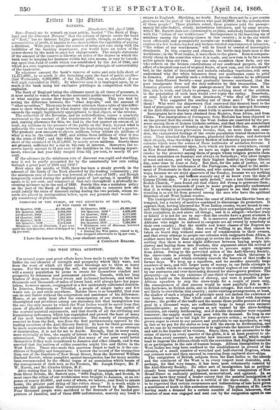Trans in 14t itur.
BANKING. Manchester, 9th April 1860.
Sin—Permit me to remark on your article, headed "The Bank of Eng- land and the Discount Houses," that the column of figures under the head of " Rest," has no interest for:the general public, though, as showing the accumulation of profit, it implies to the shareholders the capability of paying a dividend. Were you to quote the reserve of notes and coin along with the liabilities of the banking department, you would have an index of the power shown by the bank to meet her engagements. The simple statement of the amount of the reserve is likewise an index of the degree m which the bank may be keeping her business within her own means, or may be trench- ing upon that fund of credit which was established by the Act of 1844, and which is a very ingenious compromise of the great principle of convertibility of the bank-note.
By whatever amount the bank's reserve of notes and coin falls short of 14,475,000/., by so much is she trenching upon the fund of public credit— (last Wednesday, ednesday, 6,962,000/. of the 14,475,0001. was so absorbed : it was well nigh exhausted in 1857). By whatever sum it is impinged upon, by so much is the bank using her exclusive privileges in competition with the capitalist.
The Bank of England being the ultimate resort in all times of pressure, it it most useful to watch what use the mercantile public make of her resources, or what surplus means they deposit in her keeping. This you find by noting the difference between the "other deposits," and the amount of "other securities." There can be no surer criterion than a table of this differ- ence to show whether and in what degree the absorption of capital by trade exceeds the supply legitimately appropriated to that object, or the reverse.
The collection of the Revenue, and its redistribution, causes a quarterly movement in the amount of the requirements of the trading community ; and, making allowance for this, we find in the last quarter an excess of, at least, six millions in the pressure of the public on the Bank, beyond what is ordinarily the case in the range between the beginning and end of a quarter. The pressure now amounts to eleven millions, being within six millions of what it was in the crisis of 1867, and within three millions of what it was in the crisis of 1847; and this while the reserves of the Bank have fallen short of the standard of 14,475,0001. by nearly seven millions. Surely these are grounds sufficient for a rise in the rate of interest. Moreover, the re- serves barely amount to 31 per cent of the liabilities in the banking depart- ment, whereas last year they ranged from 42} per cent, to nearly 61 per cent.
If the advance in the minimum rate of discount was rapid and startling, may it not be partly accounted for by the unnaturally low rate ruling through a great part of 1858 and 18.59 ?
Ever since the middle of 1858, there has been a steady growth in the amount of the funds of the Bank absorbed by the trading community ; yet the minimum rate of discount was lowered at the close of 1858; and though temporarily raised during the political panic of last spring, it speedily fell again to 2i per cent, and remained at that rate throughout a gradually in- creasing pressure up to the end of 1869. Surely this was a mistaken policy on the part of the Bank of England. It is difficult to conceive how she could justify the rates of discount ruling during the two periods, whose re- cords are placed in juxtaposition below, upon any grounds that would im- ply consistency of practice.
PRESSURE OF THE PUBLIC, ON THE RESOURCES OF THE BANK, AT THE CLOSE OP THE
3d Quarter, 1858 £3,691,000 4th Quarter, 1858 • 4,630,000 1st Quarter, 1859 4,797,000 2d Quarter, 1859+ 5,480,000 3d Quarter, 1859 6,521,000 4th Quarter, 1859 7,584,000 Minimum rate of discount, 3 per cent • Minimum rate of discount lowered until the last Quarter, when it dropped to from 3 to 21 per cent.
2¢ per cent. + During the War panic, raised to 41,
but dropped afterwards to 21 per cent.
I have the honour to be, Sir, your obedient servant,
3d Quarter, 1848 £3,586,000 4th Quarter, 1848 2,086,000 let Quarter, 1849 1,991,000 2d Quarter, 1849 3,081,000 3d Quarter, 1849 2,712,000 4th Quarter, 1849 2,114,000
A CONSTANT READER.


























 Previous page
Previous page